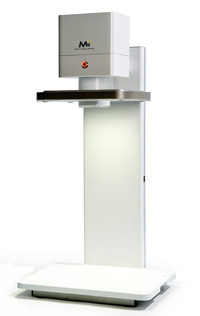Mar 26 2010
Nikon Instruments, Inc. today announced its newest product in the digital pathology market, the Mi macro imaging grossing station.
 Mi Macro Imaging Station
Mi Macro Imaging Station
The Mi revolutionizes gross histology documentation by addressing the workflow necessary to cleanly and safely capture, annotate, compare and measure images of biopsied gross specimens in the pathology, histology and forensic lab. The Mi offers a stable, versatile, contamination-free imaging station which is simple to operate via touch-screen or foot-pedal. Creating an invaluable source of reference, gross tissue images can enhance the interpretation and understanding of subsequent tissue sections and provide the first step in capturing an entire pathology case history.
Images produced by the Mi can be saved for use in case records, Laboratory Information Systems (LIS), as part of an audit trail, and for annotation and use in downstream analyses and applications. Telepathology applications are available to assist in histology specimen preparation.
The Mi macro imaging station was designed specifically for easy integration with existing workspaces and procedures, and simplifies the work of pathologists. Key attributes include:
- LED lighting: The Mi’s integral overhead LED illuminates the specimen to create bright, sharp images with perfect detail. Cool LED lighting also ensures that specimens will not be damaged by heat.
- Ease of use: Users do not need to have any expertise in photography for successful imaging, which makes the Mi ideal for busy, multi-user labs. With an intuitive software graphical user interface (GUI), straightforward operating options, such as “lighter,” “darker,” and “closer,” as well as push button operation, image acquisition is made simple, no matter the scientist’s skill level with digital imaging.
- Top quality camera: The Mi comes equipped with a fully enclosed, top quality Nikon DS-Fi1 digital camera with motorized lens for high-resolution imaging. Users can select either standard or publication quality images, as required.
- Reduced risk of contamination: The water- and splash-resistant workstation surfaces, keyboard, mouse, and touch-screen PC all are designed to be wiped clean after use. Additional hygienic precautions were taken by removing the need to touch the camera during operation, with the option to carry out functions via a choice of touch-screen, key board, mouse, foot-pedal, or barcode reader.
- Choice of PC: The Mi can be supplied with the standard recommended touch-screen PC, network PC or, if preferred, can be used with the laboratory’s own PC and network system without compromising function.
- Pathology-focused software: Dedicated pathology-focused Mi software can be integrated with Nikon’s NIS-Elements Documentation (D) software to bring all aspects of the digital pathology imaging environment together. Simple menu options enable rapid image capture and annotation, live comparison, object measurement and counting, and database functions to maximize information from images.
Allison Forlenza, Microscopy Product Specialist for Nikon Instruments, says, “The Mi macro imaging station provides pathologists, histologists, and forensic scientists, an intuitive, effective tool for complete documentation. We are excited to release this system in time for USCAP and hearing from these scientists about the productivity they can accomplish with this easy to use system.”
The Nikon Mi macro imaging station will be available for purchase in April 2010.